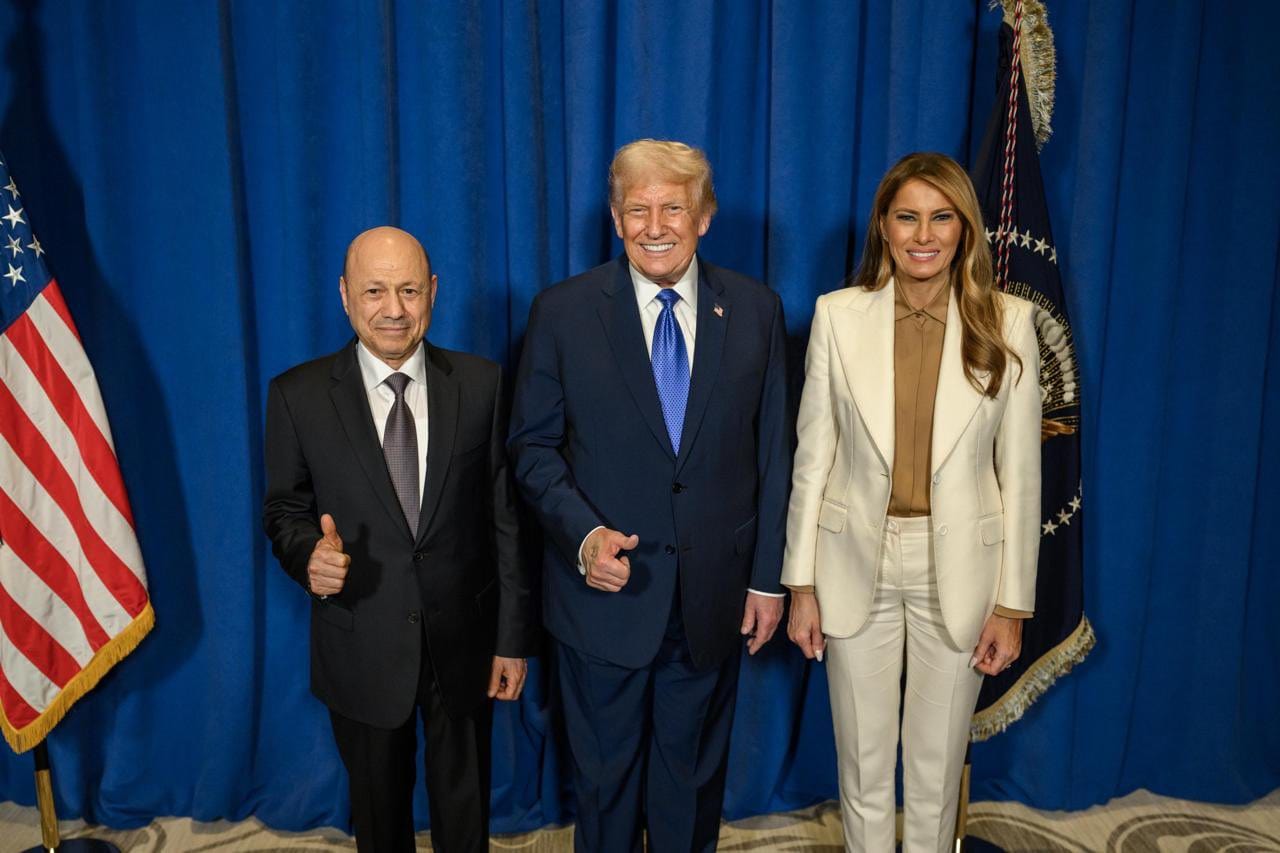
Photo shows U.S. President Donald Trump with Rashad Al-Alimi and First Lady Melania Trump in New York – Source: Al-Alimi’s X account, September 27, 2025.
Last updated on: 27-09-2025 at 7 PM Aden Time
|
|
New York (South24 Center)
Since the delegation of Yemen’s Presidential Leadership Council arrived in New York on September 22 to participate in the 80th session of the United Nations General Assembly, it was evident that the delegation came with a packed agenda of meetings and engagements aimed at solidifying its presence on the international stage and expanding communication channels with key global actors.
The delegation included Council Chairman Rashad Al-Alimi, and members Aidrous Al-Zubaidi and Abdullah Al-Alimi. However, representation and meetings were primarily divided between Rashad Al-Alimi and Al-Zubaidi.
Activities began with the delegation's participation in the General Assembly’s opening session, where the Presidential Council appeared as a present political bloc within the UN corridors.
On September 24, Al-Zubaidi delivered a speech during a high-level UN Security Council debate dedicated to the topic of artificial intelligence. Al-Zubaidi not only addressed the developmental opportunities of this technology but also explicitly warned against its exploitation by the Houthis for media disinformation and developing autonomous weapon systems that threaten regional and international security.
Read more at: Al-Zubaidi Warns of Houthi Exploitation of Artificial Intelligence
In his speech before the General Assembly, Rashad Al-Alimi stressed that the Houthis pose a direct threat to international peace and security through their maritime and missile attacks and their alignment with Iran’s agenda. He affirmed that the humanitarian suffering of the Yemeni people cannot be separated from these threats and called for greater international economic and political support for the Yemeni government.
On the other flank, Al-Zubaidi was occupied with conveying parallel messages focusing on the Southern cause and the right to self-determination, without being absent from the delegation’s official meetings. In remarks to international media such as The Guardian and The National, Al-Zubaidi clarified that the most realistic solution lies in establishing two states within Yemen, asserting that the South is ready to exercise its sovereignty and forge its international partnerships. He emphasized that Southern independence could be an entry point to broader regional stability, at a time when forcibly removing the Houthis from the North appears to be a difficult task for the international community.
This parallel discourse extended to a closed session at Columbia University, where Al-Zubaidi presented his vision for the South’s future to an elite academic and diplomatic audience in his capacity as Vice President of the Presidential Council, reflecting the growing weight of the Southern issue within the UN sphere.
The delegation’s engagements were intensive and varied. Council members met with the German Foreign Minister, discussing Houthi threats to navigation and the importance of German contributions to supporting Yemen’s economy. Meetings were also held with the Bahraini Foreign Minister, the President of Iraq, and the Emir of Kuwait, moves that seem to affirm the Yemeni government’s pursuit of strengthening its Arab and Gulf ties.
In another dimension, the delegation met with the Executive Secretary of ESCWA and officials from the UNDP, focusing discussions on economic recovery programs and financing infrastructure and energy projects.
The most notable meeting was with UN Secretary-General António Guterres, who announced new measures to protect humanitarian work in Yemen, including relocating UN organization offices to Aden and minimizing engagement with the Houthis to the essential minimum. This decision marks a significant shift in the UN’s stance and response to repeated denunciations by the Yemeni government regarding the Houthi exploitation of aid. Furthermore, the delegation also met with the UN Under-Secretary-General for Humanitarian Affairs to discuss funding the response plan and enhancing aid access to those in need.
On September 27, a photo shared by Rashad Al-Alimi’s X account showed U.S. President Donald Trump with Al-Alimi and First Lady Melania.
Additionally, the delegation met with Russian Foreign Minister Sergey Lavrov, in a meeting that affirmed the traditional relations between Moscow and Aden and the necessity of continued political dialogue. Al-Zubaidi was absent from this meeting but participated in others with international partners such as the Vice President of Uganda and the Croatian Foreign Minister.
Amid the diverse messages, with Al-Alimi adhering to the traditional narrative of the Yemeni government, and Al-Zubaidi focusing on the future of the South, self-determination, and the Houthi file, the delegation presented a complex yet integrated picture, reflecting a multi-track political reality.
This participation followed an internal crisis within the Presidential Council concerning unilateral decisions issued by Chairman Rashad Al-Alimi and subsequent decisions issued by Aidrous Al-Zubaidi within the framework of the Yemeni government. In a meeting in Riyadh on September 18, an agreement was reached to review these decisions by the legal team supporting the Presidential Council.
Previous article
Next article